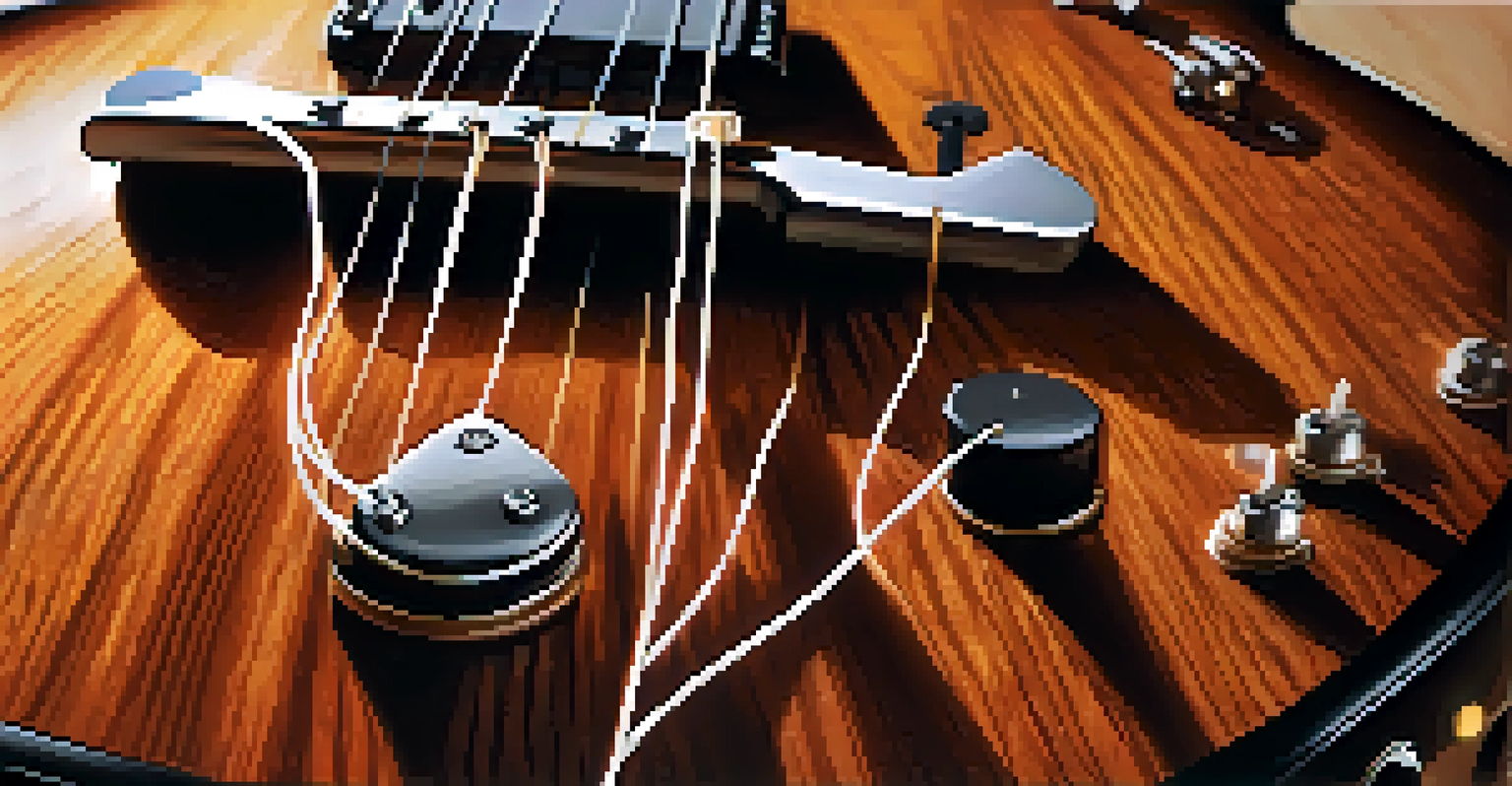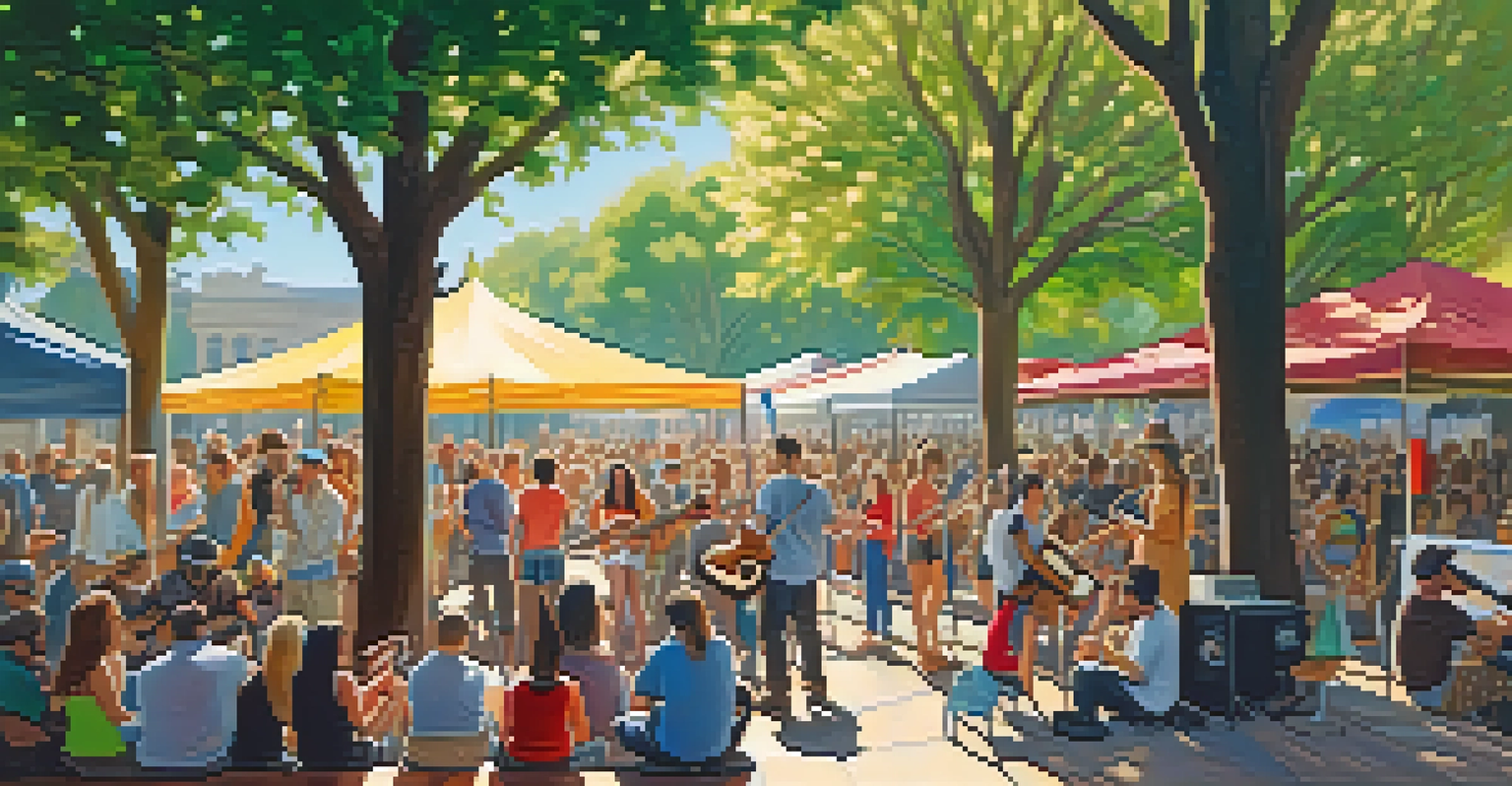Cultural Impact of Guitar Music in Film Scores

The Evolution of Guitar in Film Scores
Guitar music has a rich history in film, evolving from traditional scoring to contemporary influences. Initially, orchestras dominated the soundtracks, but as filmmakers sought new ways to connect with audiences, the guitar emerged as a powerful tool. Its versatility allows it to convey a range of emotions, from the upbeat strumming in comedies to the haunting riffs in thrillers.
The guitar is a remarkable instrument; it can express the inexpressible.
One of the pivotal moments for guitar music in film was the rise of rock and roll in the 1950s and 60s. Directors began to integrate popular music into their scores, making the guitar a staple for contemporary narratives. This shift not only broadened the appeal of soundtracks but also changed how filmmakers approached storytelling, blending visual and auditory experiences.
Today, guitar music continues to play a significant role in film scores, with composers experimenting across genres. From classical guitar solos to electric guitar-driven soundtracks, the instrument’s adaptability ensures it remains relevant. As a result, we witness a fascinating fusion of styles that reflects cultural shifts and audience preferences.
Guitar Music and Emotional Resonance
The emotional power of guitar music in films cannot be overstated. Its unique sound can evoke nostalgia, joy, or sadness, striking a chord with viewers on a personal level. For instance, a gentle acoustic melody can enhance a romantic scene, while a distorted electric riff can amplify tension in a suspenseful moment.

Many iconic film scores utilize guitar to create memorable motifs that resonate with audiences long after the credits roll. Think of the haunting guitar in 'The Good, the Bad and the Ugly' or the uplifting strumming in 'The Secret Life of Walter Mitty.' These moments highlight how the guitar can become a character in its own right, shaping our emotional journey through the film.
Guitar's Impact on Film Scores
The guitar's versatility has transformed film scoring, allowing composers to convey a wide range of emotions and enhance storytelling.
Moreover, guitar music can bridge cultural gaps, making stories more relatable across diverse audiences. Its universal appeal means that regardless of language, the feelings conveyed through guitar can be felt and understood by anyone, enhancing the overall impact of the film.
Guitar Genres and Their Cinematic Roles
Different guitar genres have found their place in film, each contributing to the storytelling in unique ways. For example, folk guitar often accompanies stories of personal journeys or struggles, while rock guitar can heighten adrenaline-fueled action sequences. This genre-specific approach allows filmmakers to tailor their soundtracks to fit the narrative's mood.
Music can change the world because it can change people.
The use of jazz guitar in film noir is another compelling example. The smooth, improvisational qualities of jazz can create a sense of mystery and intrigue, perfectly matching the genre's themes. This strategic choice showcases how the guitar can elevate a film's atmosphere and enhance its character development.
Additionally, world music influences have introduced a plethora of guitar styles into film scores, reflecting cultural diversity. The incorporation of flamenco, reggae, or blues guitar not only enriches the soundtrack but also honors the cultural heritage represented in the story, making the experience more authentic for the audience.
Iconic Films Featuring Memorable Guitar Scores
Several films have left a lasting impression through their memorable guitar scores. For instance, 'Pulp Fiction' features a mix of surf rock and funk guitar that captures the film's edgy vibe and unique storytelling style. The soundtrack itself has become iconic, influencing countless filmmakers and musicians alike.
Another example is 'The Shawshank Redemption,' where the acoustic guitar beautifully underscores themes of hope and freedom. The poignant melodies resonate with viewers, making the film's emotional moments even more impactful. It's a testament to how a well-placed guitar piece can elevate a scene to unforgettable heights.
Cultural Reflections in Guitar Music
Guitar music in films often mirrors societal values, enriching narratives and promoting cultural appreciation through diverse styles.
These films demonstrate how the guitar can become synonymous with the film's identity, transcending the screen to become part of popular culture. From memorable soundtrack albums to iconic scenes, the guitar's role in film continues to be significant and celebrated.
The Role of Guitarists in Film Scoring
Guitarists have carved a niche for themselves in the world of film scoring, bringing their unique expertise to the table. Many renowned composers collaborate with talented guitarists to create distinctive sounds that enhance their scores. This partnership often leads to innovative compositions that push the boundaries of traditional film music.
Guitarists like Hans Zimmer and Ennio Morricone have made significant contributions to film scores, integrating guitar elements into their compositions. Their work showcases the guitar's flexibility, merging it with orchestral arrangements to create rich, textured soundscapes. This blending of styles not only enhances the film's emotional depth but also showcases the guitar's versatility.
As the industry evolves, the role of guitarists in film scoring continues to expand. With the rise of technology and digital music production, guitarists are now experimenting with electronic sounds and effects, creating new dimensions in film music. This evolution keeps the guitar relevant and exciting in an ever-changing cinematic landscape.
Cultural Reflections in Guitar Music for Film
Guitar music in film often serves as a mirror reflecting societal values and cultural shifts. For example, the rise of punk rock guitar in the 1980s coincided with a youth-driven rebellion against mainstream norms, which was captured in films of that era. This connection between music and culture highlights how guitar can convey the zeitgeist of a particular time.
Moreover, films that incorporate diverse guitar styles can educate audiences about different cultures. By featuring traditional guitar music from various regions, filmmakers not only enrich their soundtracks but also promote cultural appreciation. This aspect is increasingly important in a globalized world where understanding and celebrating diversity is vital.
Future of Guitar in Film Scoring
As technology evolves, guitar music in film scoring is set to innovate and resonate with audiences in new and exciting ways.
As cultural narratives evolve, so does the way guitar music is used in film. Contemporary films often challenge stereotypes and explore complex identities through their soundtracks, showcasing how the guitar can express a wide range of experiences. This cultural dialogue is crucial in fostering empathy and understanding among audiences.
The Future of Guitar Music in Film Scoring
As we look to the future, the role of guitar music in film scoring is likely to evolve alongside technological advancements. With the rise of artificial intelligence and music software, composers are experimenting with new sounds and techniques that can enhance the traditional use of guitar. This blending of technology with artistry promises exciting developments in film music.
Additionally, the growing popularity of independent films offers a platform for innovative guitar compositions. Independent filmmakers often take creative risks, leading to fresh interpretations of how guitar music can be utilized in storytelling. This shift can result in more diverse soundtracks that resonate with a broader audience.

Ultimately, the future of guitar music in film scoring will depend on the willingness of composers to embrace change while honoring the instrument's rich history. As filmmakers continue to seek new ways to engage audiences emotionally, guitar music will undoubtedly remain a vital component of the cinematic experience.